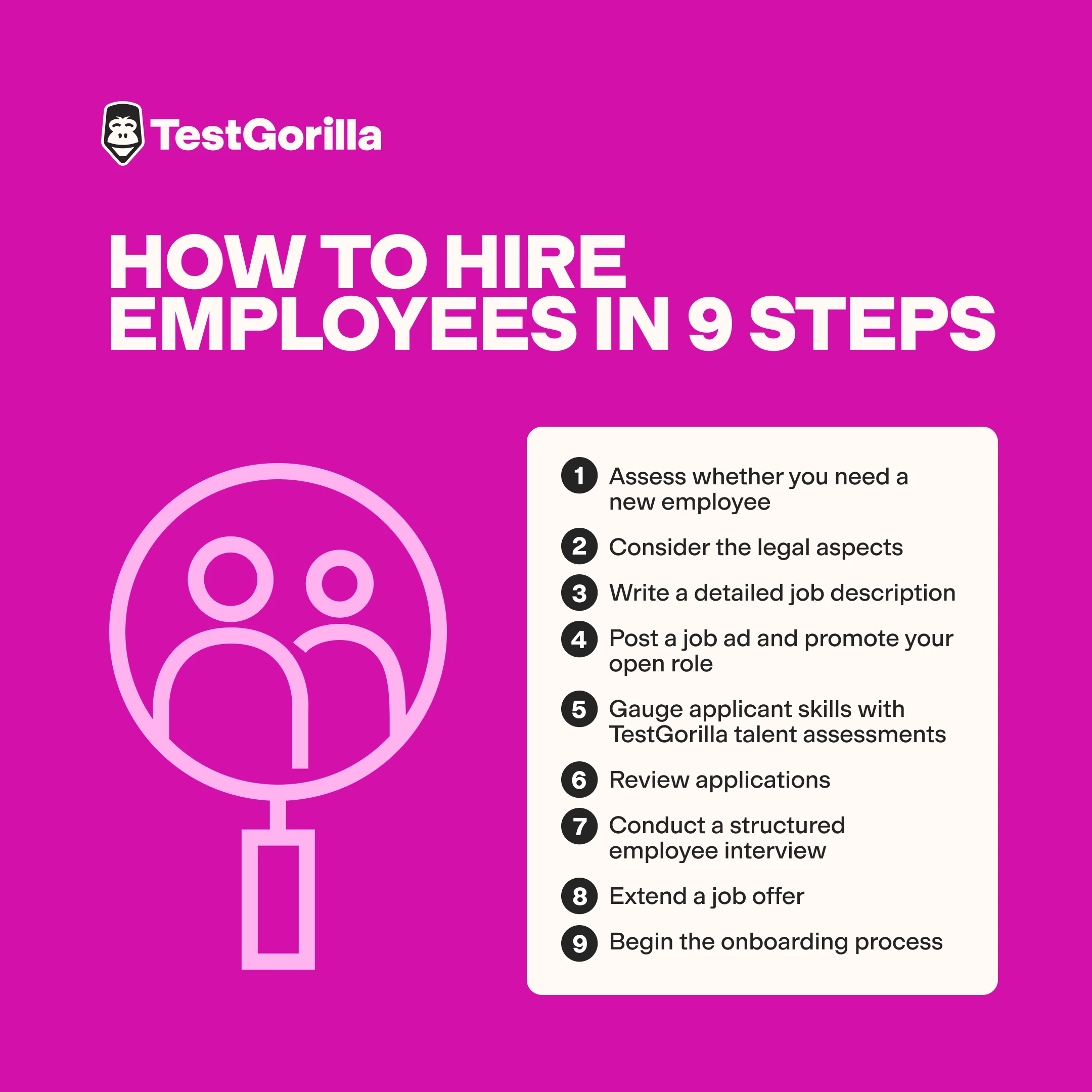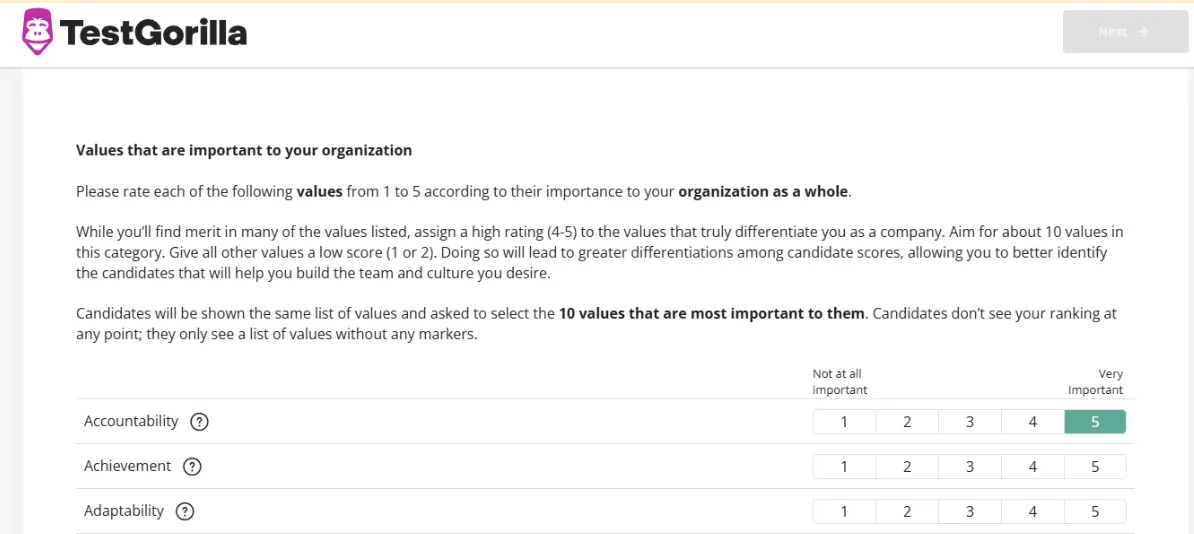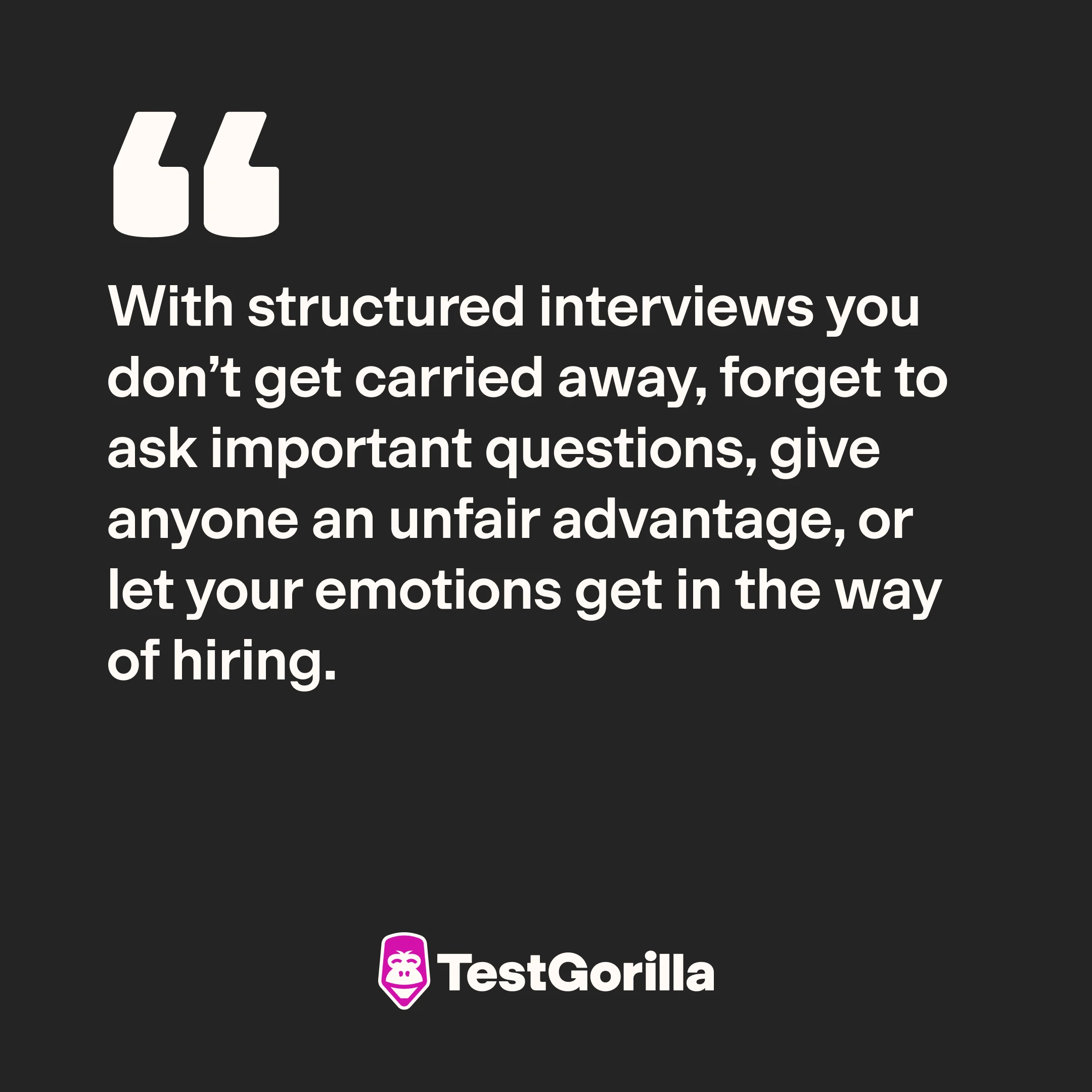How to hire employees: A step-by-step guide
Transform the way you hire with multi-measure talent assessments
According to Glassdoor, the costs of hiring new employees are around $4,000 per hire for US employers, and at the same time, 62% of small and medium businesses admit that they’ve made a recruiting error.
Don’t leave recruitment up to chance.
Learning how to hire employees effectively is well worth your time. The goal is to create a reliable, repeatable recipe for success.
In this article, we explain how to hire great employees, including details and differences between hiring full-time employees, part-time workers, remote talent, and more.
Table of contents
How to hire employees in 9 steps
These steps include all the best practices for hiring employees.
1. Assess whether you need a new employee
The first step is an important question: Do you actually need to hire an employee at this moment?
Hiring new employees comes with its toll, including hidden onboarding costs like expenses associated with paperwork, admin work, and deferred productivity.
Therefore, you should first assess the current state of your business and see if you truly need a new employee for new operations.
You might want to consider different alternatives to hiring employees:
Alternatives to hiring new employees | When to use them |
Outsourcing specific tasks to independent contractors | - When you need to delegate tasks that require expertise or niche knowledge but don’t warrant a full or part-time employee - For infrequent or one-off tasks |
Working with an agency | - When you have a large scope of work to outsource to a specialized team with established systems and processes - When your business scales and your old systems can’t follow |
Hiring a virtual assistant | - When you need to delegate a variety of different or generalized tasks - When you need specialized help with things like accounting or sales but also require room for some ad hoc tasks as they pop up - When you want to focus on your specialty and need other duties like personal chores or administration off your plate |
Hiring an intern | - When you don’t urgently need to hire, so you can invest some time in mentoring the right person for the role - When you want a fresh recruit who’s eager to learn and in it for the long run |
Please note that even if you don’t need to recruit right away, you can still source and engage candidates. In fact, we recommend doing this as part of a proactive recruiting approach to prepare you for hiring employees when the need arises.
2. Consider the legal aspects
Figuring out how to hire remote employees has to include the logistics: what you need to prepare ahead of time, which benefits to offer, and how to process payments, for instance.
Hiring seasonal employees is its own story, especially if you’re recruiting internationally for an onsite role – this could involve temporary residence permits for the workers.
For long-term positions, there are some key differences between hiring full-time employees and part-time workers.
To cover your bases, here are legal requirements that you should fulfill when it comes to hiring a new employee:
Perform background checks, verify employment eligibility, and contact references
Register with the relevant state or national agency (in the US, examples include obtaining an Employer Identification Number from the IRS)
Keep track of minimum wage requirements and payroll tax withholdings (employment tax, income tax, federal tax, state tax, and other tax forms)
Fill out key forms for hiring new employees (in the US, examples include new hire reporting and recording the social security number on form W-4, W-2, I-9, etc.)
Set up a payroll system or obtain a payroll service
Adopt the correct safety measures (like workers’ compensation insurance)
The specifics depend on your exact location and local labor laws, so make sure to research them in detail before hiring new employees. Consult with an attorney or human resource expert to make sure you’re on the right track and handling everything correctly.
3. Write a detailed job description
If you analyzed your business and decided that there’s a real need for a new hire, then you already know what the person should be doing in your company.
Write it down for your job ad as specifically as possible.
It’s essential to be as detailed as possible in your job description because it:
Helps you gain clarity on the things you need to delegate
Shows your prospective candidates exactly what’s expected of them to succeed at the job
Attracts the ideal candidates for the role, who have the necessary skills and personalities
Turns away job seekers who obviously don’t match the role, so you don’t have to spend time filtering them out later
Avoid vague formulations or unrealistic requirements, and be as precise as possible.
Tip: If you’re wondering how to hire diverse employees but you keep recruiting the same type of people, your job requirements might need scrutiny.
Make sure you’re not disqualifying good candidates because of arbitrary reasons like having an atypical career path or coming from a different background.
4. Post a job ad and promote your open role
You have to market your new opening so that prospective candidates can know that there’s a demand for their skills.
LinkedIn, Indeed, other social media platforms and job sites can help with this process, but you can also use word-of-mouth marketing tactics to find qualified candidates.
It’s one of the preferred methods of finding suitable applicants for small business owners.
Referrals also help with employer branding, building a reputation with potential candidates, and sourcing future talent for companies of all sizes.
If you’re hiring seasonal workers internationally or are open to remote talent, it’s worth looking into local job boards in different countries and student platforms.
5. Gauge applicant skills with TestGorilla talent assessments
One of the best ways to evaluate potential employees’ abilities is by using TestGorilla’s online pre-employment skills assessments. In one assessment, you can combine up to five tests, each evaluating a different skill. For example, you can use a combination of:
Role-specific skills tests
Language tests
Cognitive ability tests
Software skills tests
You can even use personality and culture tests to assess your candidates’ behavior, personality traits, and culture add potential.
For example, here’s a quick glance at the Culture Add test questions:
This approach to skills-based hiring is called multi-measure testing, and it’s the best way to objectively measure your candidates’ overall job performance potential, compare applicants, and limit unconscious bias.
Talent assessments ensure that only qualified and well-matched candidates make it to your potential employee interview stage – no matter what their CVs say about them. This saves you time and increases your chances of making a great hire.
Best of all, the benefits can apply to all companies.
Have you ever wondered how to hire employees for small businesses when you have to compete with big enterprises and their larger budgets?
Multi-measure talent assessments combined with employee interviews are a time-saving and cost-effective strategy that works across the board.
In fact, this is how we hired some of our best candidates and first employees when TestGorilla was an early-stage startup – including our content marketing coordinator Sheena Muirden. Sheena didn’t have a resume that indicated she had specialized marketing skills, but the assessment showed she was the right candidate for the job. You can read about it in our article on recruitment for startups.
Meanwhile on the enterprise side of things, Dyninno Group uses TestGorilla talent assessments to scale its recruitment process without sacrificing the quality of hires. As it continues to hire hundreds of candidates each month using pre-employment tests, the same recruiting team is able to go through four times the number of applicants, increasing their productivity by 400%.
Because Dyninno’s recruiting team focuses on skills and motivation, they often suggest alternative roles to great applicants who can bring value elsewhere in the business.
Use TestGorilla to unlock the power of talent assessments
TestGorilla’s tests give you a 360-degree view of your candidates 100% for free. All you need to do is sign up and start planning your talent assessments.
6. Review applications
Once all talent assessments are in, you can get a good look at who might be the right match for your company. In TestGorilla, your candidates are scored and compared automatically.
You can read through their results and narrow your selection to 3-5 top candidates that proceed to the employee interview stage.
Next, get back in touch with your candidates – including the ones you didn’t choose. Thank everyone for their time, and let them know the status of their job applications.
Here are some key items to include in the email:
Information about their test performance and that you’re interested in moving forward with them
Interview scheduling invitations for successful candidates with technical details like preferred tools, times, and in-person or virtual addresses
Brief interview agendas outlining what you want to discuss, how many people are attending, and how long it will take
7. Conduct a structured employee interview
With structured interviews, you ask each candidate the same questions in the same order and evaluate their responses after you’ve interviewed everyone.
This ensures you don’t get carried away, forget to ask important questions, give anyone an unfair advantage, or let your emotions get in the way of hiring.
You end up with more comparable and objective information about candidates, helping you make unbiased and data-driven decisions. Structured employee interviews also take less time to conduct.
Here are some steps to adding a structured interview process:
Prepare interview question templates
Include follow-up questions to help candidates express themselves clearly
Consider a hiring panel instead of a single interviewer to limit personal bias
Create an interview scorecard to help compare candidates
Tell candidates what to expect during the interview to reduce their anxiety
Maintain a relaxed atmosphere during interviews
Take notes of candidate responses so you can compare them
Let candidates know when they will hear back from you and thank them for their time
Make sure you only evaluate and compare the results once you’re done with all employee interviews – not earlier.
8. Extend a job offer
Being transparent and upfront is the key to a solid relationship foundation.
In the process of hiring new employees, transparency means being specific and not leaving important details out in your offer letter.
Here are some essential items to cover:
Details | Example |
Job title and job responsibilities | Customer Service Representative: answers incoming calls, resolves product complaints, etc. |
Working hours | Monday-Friday, 9 a.m. to 5 p.m. |
Department | Customer Service Department |
Manager | Customer Service Manager |
Salary details | $25 per hour ($52,000 per year) |
Employee benefits | health insurance, retirement plans, etc. |
Contract length and type | 6-month, contract-to-hire |
Add any role-specific details. For example, contracts for content creators usually include clauses about the ownership of deliverables.
To avoid potential conflicts, discuss these things upfront and get any deal-breakers out of the way.
9. Begin the onboarding process
This stage is about preparing required documentation in advance, having standard operating procedures in place, and providing a thought-out onboarding process to help set your new employees up for success.
Here’s what you need to take care of to onboard new employees on their first day and beyond successfully:
Communication channels and other tools or apps
Chain of command and who the employee reports to
Introducing team members and leaders
Employee handbooks and SOPs for job-related tasks
Payroll and administration
Paperwork for legal and corporate compliance (like Department of Labor policies)
Encouraging feedback and asking if they need anything
Potentially assigning a buddy to help with integration
How to hire employees in the most effective way
Screening your candidates with multi-measure talent assessments before employee interviews eases your recruitment process and minimizes the risk of hiring under-qualified candidates for the role.
TestGorilla has hundreds of pre-employment tests that enable you to screen as many candidates as you need while eradicating bias from the process. Check out our demo to see how to hire employees using talent assessments.
Our tests apply to all roles and measure more than just the hard skills for the job. You can see the details in the product tour.
Ready to transform the way you recruit? Sign up for a Free forever plan.
FAQs on how to hire employees
Below, we summarize how to hire good employees for any role.
How do you create a hiring process?
Before hiring employees, you need to consider:
Costs in time and labor for recruiting and onboarding
Candidate experience
Your goals and the most efficient way to get there
Tolls and implications of a bad hire
Importance of finding the right match for the role
We recommend the proactive recruitment approach to set you up for success.
How do I start hiring employees?
Start hiring new employees by assessing the gaps and shortages in your company – ideally before they grow too large to handle.
Evaluate whether you genuinely need a new employee or you can solve the gap in another way. If you do need to hire, writing the job description should be easy and you can start sourcing candidates.
What are the 5 stages of the hiring process?
Creating a job description
Publishing the job posting and engaging candidates
Assessing talent attributes, skill sets, personalities, and cultural match
Reviewing applications and interviewing successful candidates
Offering the job and onboarding the candidate
Find skilled candidates who align with your values
Discover how TestGorilla’s Culture Add and personality tests can uncover top talent.
How to hire employees in the best way?
Here’s how to hire employees, ensure they contribute positively to your company culture and perform well in their roles:
Create a proactive recruitment strategy to always be prepared with a vetted talent pool
Ditch the resumes and instead test applicants fairly using talent assessments
Be upfront about your expectations and communicate clearly to get started on the right foot and avoid misunderstandings
Related posts
Hire the best candidates with TestGorilla
Create pre-employment assessments in minutes to screen candidates, save time, and hire the best talent.
Latest posts
The best advice in pre-employment testing, in your inbox.
No spam. Unsubscribe at any time.

Hire the best. No bias. No stress.
Our screening tests identify the best candidates and make your hiring decisions faster, easier, and bias-free.
Free resources
This checklist covers key features you should look for when choosing a skills testing platform
This resource will help you develop an onboarding checklist for new hires.
How to assess your candidates' attention to detail.
Learn how to get human resources certified through HRCI or SHRM.
Learn how you can improve the level of talent at your company.
Learn how CapitalT reduced hiring bias with online skills assessments.
Learn how to make the resume process more efficient and more effective.
Improve your hiring strategy with these 7 critical recruitment metrics.
Learn how Sukhi decreased time spent reviewing resumes by 83%!
Hire more efficiently with these hacks that 99% of recruiters aren't using.
Make a business case for diversity and inclusion initiatives with this data.
























